Iconic: The NYC Convenience Store with a World-class Magazine Section
Hemal Sheth took over his uncle’s convenience shop in 1995 and turned it into Iconic Magazines. Image: Madeleine Magill.
There are only so many places in the world where you can buy a vintage Playboy, a Mega Millions lotto ticket, a White Rascal tall boy, copies of The Gentlewoman, Boys! Boys! Boys! and Apartamento, a frozen chicken tikka masala, your week’s supply of toilet paper, and a hearty tote bag, all in one place — even in a city like New York. And better yet, in a place that has some old bones and an indescribable charm to it, where you might even run into a famous musician buying some lunch. (Like, perhaps, Frank Ocean, who issued his limited-print Boys Don’t Cry magazine exclusively in this shop in 2016.)
This place is none other than Mulberry Iconic Magazines, a convenience shop with a world-class magazine section that has expanded to two more locations in the area and carries thousands of publications — including hard-to-find ones like Sneaker Freaker, Kink, and Grazia, plus YOLO Journal, Racquet, and Tatler, plus Konfekt, The Drift, and BUTT.
For the shop’s owner, Hemal Sheth, this is not the career he expected. He was brought up in India and studied computer science before moving to New York in 1993, where he started working at his uncle’s convenience store and entered the world of art and fashion. From there, he realized that magazines could be the big selling point, for the city’s tourists and locals alike. That’s when he founded Iconic.
Located in SoHo, Iconic has adapted to keep up with historic moments, whether it was by taking care of the community after tragedies including 9/11 and Hurricane Sandy, or finding ways to keep print alive and well in the digital-age. Here, Sheth shares what it was like to take over his uncle’s convenience shop 28 years ago and turn it into a New York cornerstone, including why he left the world of engineering; how his business thrives selling staples like ice cream, ibuprofen, and IPAs alongside indie mags; and what titles keep customers coming back for more.
You made a big leap from engineering to the arts and fashion world. Why?
Well, I love reading and I was very fond of magazines. As a newcomer in America, I stayed with my uncle and started to work at his convenience store. I soon started to like managing the business and I started thinking and implementing new ideas that would help bring more customers to the store. My uncle’s shop didn’t sell very many magazines — only some weeklies and monthlies. I started bringing more titles in because I was enthusiastic about culture and the arts. The magazines made other people excited, too, and soon I changed the entire business in ’96 and took it over from my uncle. I’d always wanted to do something on my own, to be a businessman.
Where does your work ethic come from?
My work ethic comes mainly from my dad. He was a surgeon in India and I saw how hard he worked to help everyone in the community. That work ethic stuck with me when I came to America and got the opportunity to manage this business. I saw how much work it took to handle all the different aspects of owning your own business in NYC, but I also saw how much I enjoyed interacting with our customers and building a community here. Ever since then, I continue to work hard because I love the community we have built here and of course there’s no feeling quite like working in NYC.
Why is there a convenience shop with things like beer and chips in the front and a world-class magazine section in the back?
We wanted to make the store something that was unique. That’s why I combined the magazines with the convenience section of the store in the front. We offer interesting products so that people can enjoy shopping here and also get everything they need in one place. But we also offer good service. When I am a customer in other stores, I observe how the business treats me, and make note of things I can improve or correct in my own business. And now most of our customers are regulars — I think because we try to take care of them.
What types of world events has Iconic seen and lived through?
On 9/11, one of my customers came into the store and told us that he saw this plane flying so low that it might hit a building. And then he finished that sentence, and we heard the boom. So we went outside, and we saw all this smoke and everything. Everyone was on the streets, covered in dust and debris, so we opened the store to give people water and beverages. For six months, it was very quiet in the neighborhood because we are located below Houston Street. Everything was closed and it was very strange. But we tried to help around the neighborhood.
Then, in 2012, Hurricane Sandy hit and there were no lights in the neighborhood for about a week. I was still coming to the store every day even though we didn’t have any power, to help customers — whatever they needed, I didn’t charge them. It made me happy to help out the neighborhood. Money is not everything in life. It’s not about business, it’s about how you can make the community stronger.
What types of challenges have you faced in this business?
Things are getting more digital and we have less traffic than we used to. Also, some of the laws in New York City drive away most of the small businesses because it's very hard to keep up with all of the regulations, no matter what you do. Then of course, there are businesses that do things illegally or find loopholes, which can make it more challenging for businesses that are doing the right things.
What’s your secret sauce to overcome those challenges?
Our main thing to keep the business afloat is our customer relationships. We try to make them happy, fill them like a hole. And the price is right. We choose which titles to sell, of course, to ensure that we have the best material here — whether that means approaching publishers or letting them come to us and monitoring how they sell.
What does your day to day work look like?
Honestly, every day is different. It used to be when I was starting off that I came in at 5 a.m., opened the store, and managed everything on my own. Now that we’ve expanded and I understand how to run the business, I’ve learned how to delegate work to my employees and what I need to focus on. A lot of my days also include having meetings with many publishers and talking with the many customers we see come into the store.
What makes great customer service?
I have learned so much about human nature; how to work together with each and every person and take care of customers. You have to be flexible, everyone has a different mindset but I try to find the thing that will make each customer happy. A human’s basic nature is that they want to be happy, right? And that’s what I try to do. People come in here and they’re in a mood, and I try to help them out to find something that can cool them down. Sometimes it involves some kind of mental reading to figure out how to help a customer find what they need. It’s like trying to read someone’s mind.
You have two children, a 23-year-old son and a 25-year -old son. Do you have dreams that your kids will take over the business one day?
Yes and no. It’s a dream, but at the same time, I want them to pursue whatever they are interested in and I don’t want to force anything on them. But they are always welcome to join Iconic. Since their childhoods, they helped out every summer and they would work the counter. And they help me out today, with computer-related things and running social media. Most importantly, they are the eyes and ears for what magazines we should bring in for the younger generation.
What are some magazine titles in your shop that you love?
My interests are spiritual, arts and design, and fashion titles. I like Cabana, Design Anthology, Pin-Up, Kinfolk, Architectural Digest, Purple, and Self Service.
If you’d like to read more from Creative Factor, subscribe to our newsletter. Or looking to tell your brand story? Introducing Creative Factor’s Storytelling Studio.
Plus, more great reads right this way…

